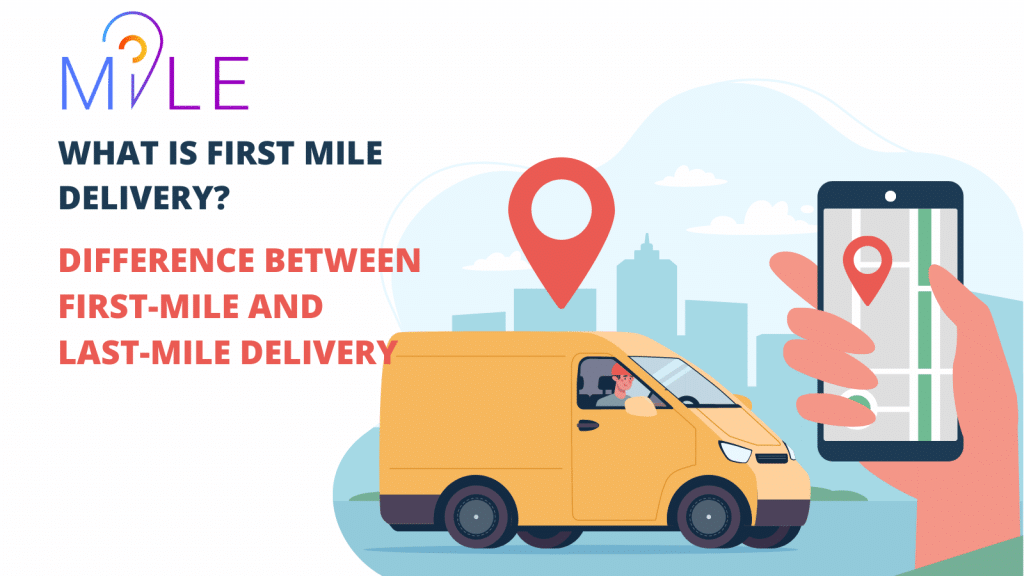What Is First Mile Logistics? Difference Between First Mile And Last Mile

The supply chain process starts with goods transportation to the retail store or supplier, and this “goods-moving” or “merchandise-moving” from the starting point is called first mile logistics. Depending on industry, first mile logistics revolves around various ways, depending on the industry type, size, and scale. Improved first-mile logistics enhances the chances of successful outcomes with increased customer satisfaction.
What Is First Mile Logistics?
The term “first mile” refers to the transportation of goods & merchandise from the manufacturing facility or warehouse to the next hub, which can be a retail distributor, ecommerce business or an FMCG distributor.
First mile has a variety of meanings for various businesses. For companies that sell products, first-mile means transporting items from distribution centers to storefronts. Finished goods are transported from a factory or plant to a distribution center.
The impact of first mile delivery is significant because it lays the groundwork for the next steps until the product reaches the end user. When done correctly, customer satisfaction rates rise considerably and business grows exponentially.
First mile is the first leg of the logistics and supply chain process. Consider big shipments coming from China, Hongkong, Indonesia etc., The process begins once the containers leave the point of origination and start moving towards the next destination. There can be multiple legs to first mile delivery and keeping a track of all of it is a bit lagged.
What Is Last Mile Delivery?
When goods or merchandise is transported from the distribution hub to the final destination, at the doorstep of customer, this is called last mile logistics or last mile delivery. The goal of last mile delivery is to safely and quickly deliver the packages at an affordable cost.
First Mile vs Last Mile Delivery – Main Differences
Cost
When it comes to cost efficiency first mile logistics are more affordable because of their bulk operation nature. First mile deliveries use large trucks and offer highly efficient transportation modes.
On the contrary, last mile delivery is expensive as it uses smaller vehicles, and has to stop at multiple venues because of individual logistics requirements.
Speed
Due to fewer stops and a bulk mode of transportation, first-mile deliveries are faster. However, last mile logistics is slower due to its personalized nature.
Customer Experience
Since first mile logistics is direct from merchandisers and retailers, it has almost very little impact on customer experience. While last mile delivery plays a crucial role in carving customer experience, as buyers expect timely deliveries of their orders.
Complexity
First mile logistics is less complex due to its bulk mode of transportation, while last-mile logistics is highly complex and requires accuracy. It has multiple stops and personalized delivery needs with real-time tracking and delivery update requirements.
First Mile vs Last Mile – Challenges
First Mile
Labeling
When items are transported via first mile logistics, sellers often ignore labeling, which is the main thing that requires careful preparations/tagging to avoid any courier mistakes, delivery mishaps, and delays.
Packaging
Packing is another issue in first mile logistics, as sellers don’t employ definitive packaging standards. Courier companies often receive packages in non-satisfactory condition. The type of packing material also plays an important role in the safety of products. For instance, damaged items result in delays, making the first-mile operation more time-consuming and difficult process.
Last Mile
Cost
The last mile is the expensive mode of logistics as it has a personalized approach which often results in refunds/returns, and failed deliveries, so every step adds up to the existing cost. Multiple stops also make the last-mile logistics less efficient, stressful, and time-consuming. All this adds up to the business’ profits.
Delivery Times
Since last mile logistics is the last leg of the delivery operations, it is viewed as the most important step in terms of time. Companies face significant pressure for timely deliveries, and if delays occur due to any reason make clients disappointed, eventually leading to a negative impact on the business reputation.
eCommerce Operations: A First Mile View
In recent years, eCommerce has experienced enormous growth and there is intense competition between the online sellers. Businesses, now, need to do everything they can to guarantee the satisfaction of their customers. As a retailer, you’re responsible for ensuring that this first phase of delivery goes smoothly and without much hassle. A simple disturbance of timeline can affect in long term.
Online retailers must give careful attention to delivery procedures at the outset. Your firm has spent time and money researching the best places to source items and materials before even getting started. Then, after that, a careful selection of a courier is made. When dealing with the courier, you must ask the appropriate questions in order to reach an optimal agreement. If you want to ship internationally, learn about any customs regulations and practices that must be followed. This can happen, for example, if you forget to rotate your goods.
If you do not handle your items with care, they may arrive to the customer in poor shape. After signing a straightforward agreement, the courier may assist you deliver the package straight to the client.
Why Should You Be Concerned With First Mile Operations?
First mile operations are critical for laying a firm foundation since they’re the main stage. Customers who are satisfied with their purchases in ideal condition and on time are referred to as happy customers. Customers abandon shipments when standards aren’t high enough or erratic. There’s simply too much competition out there to let even little mistakes go unnoticed.
Summarizing First Mile
The process of getting a product to the customer is known as first mile logistics (FML). It generally refers to transportation, although it also includes the construction of materials. The ultimate objective of effective first-mile operations is to satisfy the client’s demands in a variety of timelines. Logistics, transportation, and inventory management procedures were properly controlled by accurate first-mile tracking. Providing visibility at this point aids in predicting outcomes that have a significant impact on the final mile operations, which involve the delivery of goods to customers.

